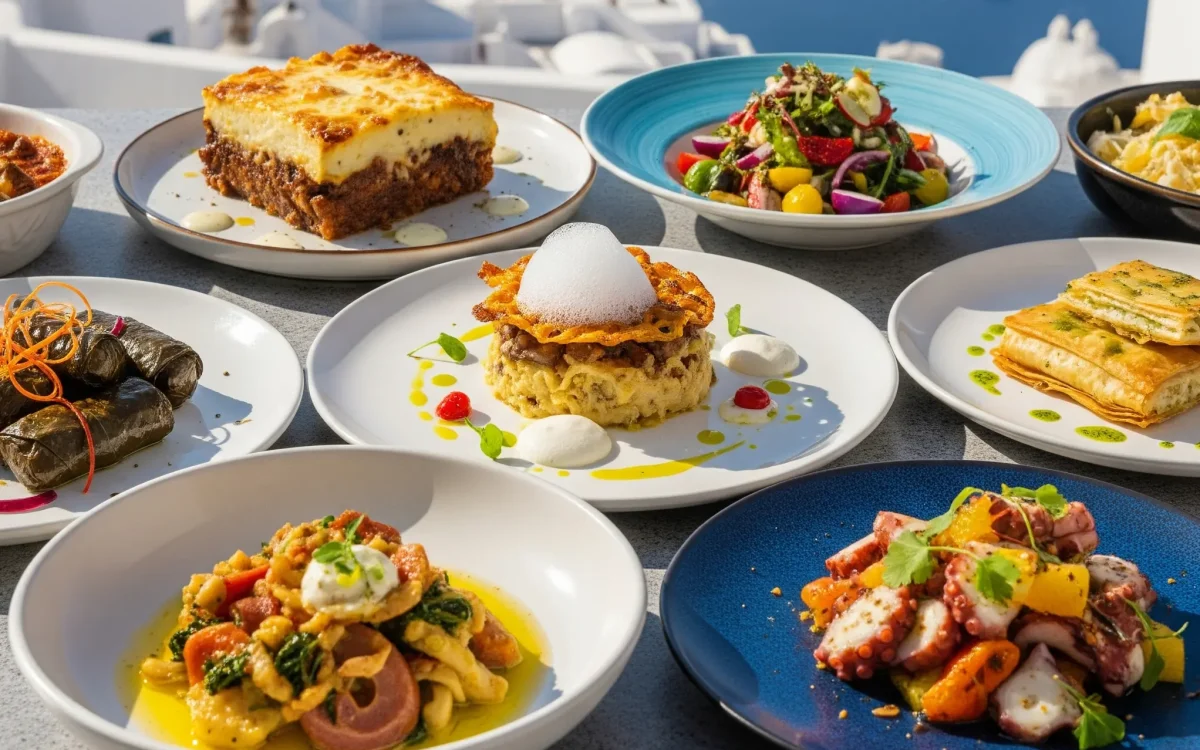The Ultimate Guide to Authentic Mediterranean Cooking That Will Transform Your Kitchen
Greek Food Recipes
Greek Food Recipes : Greek cuisine represents one of the world’s most beloved culinary traditions, offering an incredible journey through flavors that have captivated food enthusiasts for thousands of years. Whether you’re seeking food recipes easy to prepare at home or dreaming of recreating the magical experiences from Greek food restaurants, this comprehensive guide will unlock the secrets of authentic Mediterranean cooking that will absolutely revolutionize your culinary adventures.
From the sun-drenched islands of Santorini to the bustling tavernas of Athens, Greek cooking embodies a philosophy that celebrates fresh ingredients, simple preparation methods, and bold flavors that dance harmoniously on your palate. This ancient culinary art form has evolved over millennia, influenced by Byzantine, Ottoman, and Mediterranean traditions, creating a unique gastronomic landscape that continues to inspire chefs and home cooks worldwide.
The Rich Heritage Behind Greek Culinary Traditions
Greek cuisine traces its remarkable origins back over 4,000 years, making it one of the oldest continuous culinary traditions in the world. Ancient Greeks understood the profound connection between food, health, and social bonding, principles that remain central to Greek cooking today. The Mediterranean diet, largely based on traditional Greek eating patterns, has been recognized by UNESCO as an Intangible Cultural Heritage of Humanity.
The foundation of Greek cooking rests on the concept of using seasonal, locally-sourced ingredients prepared with techniques passed down through generations. This approach ensures that every dish tells a story, connecting diners to the land, sea, and cultural heritage of Greece. The emphasis on fresh vegetables, legumes, seafood, olive oil, and herbs creates a nutritional powerhouse that promotes longevity and well-being.
According to research from the Harvard T.H. Chan School of Public Health, the Mediterranean diet pattern, exemplified by traditional Greek cuisine, significantly reduces the risk of heart disease, certain cancers, and cognitive decline.
Essential Ingredients That Define Greek Cooking
Understanding Greek cuisine begins with familiarizing yourself with the cornerstone ingredients that appear repeatedly throughout traditional recipes. These ingredients form the backbone of authentic Greek flavors and are readily available in most grocery stores today.
Olive Oil: The Golden Foundation
Extra virgin olive oil serves as the cornerstone of Greek cooking, used not just for cooking but as a finishing touch that adds richness and depth to dishes. Greek olive oil, particularly from regions like Kalamata and Crete, is renowned worldwide for its exceptional quality and distinctive flavor profile.
Fresh Herbs and Aromatics
- Oregano: The most iconic Greek herb, used both fresh and dried
- Parsley: Flat-leaf parsley adds brightness to countless dishes
- Dill: Essential for dishes like dolmades and tzatziki
- Mint: Frequently used in salads and meat dishes
- Basil: Adds aromatic complexity to sauces and salads
Signature Cheeses
Greek cheeses play a crucial role in defining the character of many traditional dishes:
- Feta: The most famous Greek cheese, perfect for salads and pastries
- Kasseri: A semi-hard cheese excellent for grilling
- Manouri: A creamy cheese ideal for desserts and appetizers
- Graviera: Similar to Gruyère, perfect for grating
Mediterranean Vegetables and Legumes
The Greek pantry celebrates vegetables and legumes as primary ingredients rather than mere accompaniments. Tomatoes, eggplant, zucchini, peppers, onions, and garlic feature prominently, while legumes like lentils, chickpeas, and giant beans form the protein foundation of many traditional meals.
Popular Greek Food Categories You Must Explore
Greek cuisine encompasses a diverse range of dishes, each category offering unique flavors and preparation methods that showcase the versatility of Mediterranean ingredients.
Mezze: The Art of Small Plates
Mezze culture represents the social heart of Greek dining, encouraging leisurely meals shared among family and friends. These small plates allow diners to sample various flavors and textures while fostering conversation and connection.
Popular mezze dishes include:
- Dolmades: Grape leaves stuffed with rice, herbs, and sometimes meat
- Spanakopita: Spinach and feta wrapped in crispy phyllo pastry
- Taramosalata: Creamy fish roe spread
- Melitzanosalata: Smoky eggplant dip
- Saganaki: Flamed cheese served with lemon
Soups and Stews: Comfort Food Perfection
Greek soups and stews demonstrate the cuisine’s ability to transform simple ingredients into deeply satisfying meals. These dishes often serve as complete meals, packed with vegetables, legumes, and proteins.
Avgolemono soup stands as perhaps Greece’s most famous soup, combining chicken broth, rice, eggs, and lemon in a creamy, comforting bowl that exemplifies the Greek approach to balancing flavors. The technique of tempering eggs with hot broth creates a silky texture that elevates this simple soup to restaurant-quality status.
Main Courses: Hearty and Satisfying
Greek main courses typically feature grilled meats, fresh seafood, or vegetable-based dishes that serve as the centerpiece of family meals. These dishes often incorporate multiple cooking techniques and layer flavors to create memorable dining experiences.
Moussaka represents the pinnacle of Greek comfort food, layering eggplant, meat sauce, and béchamel in a dish that requires patience but rewards with incredible depth of flavor. This dish perfectly exemplifies how Greek cooks transform humble ingredients into extraordinary meals through careful technique and generous seasoning.
Easy Greek Food Recipes to Master at Home
Learning to cook Greek food at home doesn’t require professional training or exotic equipment. Many traditional food recipes easy to prepare can be mastered with basic kitchen tools and readily available ingredients.
🌍 “Ready to Escape the Ordinary?”
Discover secret travel deals that most people never see.
From dreamy beaches to hidden city gems — book now and save up to 60% on flights & hotels.
👉 Grab Your Exclusive Travel Deal Now »
(Free booking • No hidden fees • Trusted by millions)
Classic Greek Salad (Horiatiki)
This iconic salad represents the essence of Greek simplicity and flavor:
Ingredients:
- 4 large tomatoes, cut into wedges
- 1 cucumber, sliced
- 1 red onion, thinly sliced
- 1 green bell pepper, sliced
- 200g feta cheese, cut into chunks
- Kalamata olives
- Extra virgin olive oil
- Red wine vinegar
- Dried oregano
- Salt and pepper
Preparation: Combine vegetables in a large bowl, top with feta chunks and olives. Drizzle with olive oil and vinegar, season with oregano, salt, and pepper. The key to authentic Greek salad lies in using the ripest tomatoes possible and high-quality olive oil.
Traditional Tzatziki
This refreshing yogurt-based sauce complements grilled meats and vegetables perfectly:
Ingredients:
- 2 cups Greek yogurt
- 2 cucumbers, grated and drained
- 4 garlic cloves, minced
- 2 tablespoons olive oil
- 1 tablespoon white wine vinegar
- Fresh dill, chopped
- Salt to taste
Preparation: Combine all ingredients and refrigerate for at least 2 hours before serving. The cooling process allows flavors to meld and develop complexity.
Simple Lemon Chicken (Kotopoulo Lemonato)
This one-pan dish delivers maximum flavor with minimal effort:
Ingredients:
- 1 whole chicken, cut into pieces
- 6 potatoes, quartered
- Juice of 3 lemons
- 1/4 cup olive oil
- 2 tablespoons dried oregano
- Salt and pepper
- 1 cup chicken broth
Preparation: Arrange chicken and potatoes in a roasting pan, drizzle with lemon juice and olive oil, season generously, and add broth. Roast at 400°F for 45-60 minutes until golden and tender.
Classic Greek Moussaka
This layered masterpiece represents the heart of Greek comfort food:
Ingredients: For the meat sauce:
- 2 lbs ground lamb or beef
- 2 large onions, diced
- 4 garlic cloves, minced
- 1 can (14 oz) crushed tomatoes
- 2 tablespoons tomato paste
- 1/2 cup red wine
- 1 teaspoon cinnamon
- 1 teaspoon dried oregano
- Salt and pepper to taste
For the eggplant layers:
- 3 large eggplants, sliced into 1/2-inch rounds
- 1/2 cup olive oil
- Salt for drawing moisture
For the béchamel sauce:
- 4 tablespoons butter
- 4 tablespoons flour
- 2 cups warm milk
- 1/2 cup grated Parmesan cheese
- 2 egg yolks
- Pinch of nutmeg
Preparation:
- Salt eggplant slices and let drain for 30 minutes. Pat dry and brush with olive oil.
- Grill or bake eggplant slices until golden brown on both sides.
- For meat sauce: Sauté onions and garlic, add ground meat, cook until browned. Add tomatoes, wine, and seasonings. Simmer for 30 minutes.
- For béchamel: Melt butter, whisk in flour, gradually add warm milk. Cook until thickened, add cheese and egg yolks.
- Layer eggplant, meat sauce, and repeat. Top with béchamel sauce.
- Bake at 350°F for 45 minutes until golden brown. Rest for 15 minutes before serving.
Authentic Greek Spanakopita
This spinach and feta pie showcases the delicate art of phyllo pastry:
Ingredients:
- 1 lb frozen phyllo pastry, thawed
- 2 lbs fresh spinach, chopped
- 1 large onion, diced
- 6 green onions, chopped
- 1 lb feta cheese, crumbled
- 4 eggs, beaten
- 1/2 cup fresh dill, chopped
- 1/4 cup fresh parsley, chopped
- 1/2 cup olive oil
- Salt and pepper to taste
- 1/2 cup melted butter for brushing
Preparation:
- Sauté onions until translucent, add spinach and cook until wilted. Cool completely.
- Mix spinach mixture with feta, eggs, herbs, and seasonings.
- Brush baking dish with melted butter. Layer 8 phyllo sheets, brushing each with butter.
- Spread spinach mixture evenly, then top with remaining phyllo sheets, brushing each layer.
- Score the top layers into squares, brush with butter.
- Bake at 350°F for 45-50 minutes until golden and crispy.
Traditional Greek Dolmades
These stuffed grape leaves make perfect appetizers or light meals:
Ingredients:
- 1 jar grape leaves, drained
- 1 cup rice, uncooked
- 1 large onion, finely diced
- 1/4 cup pine nuts
- 1/4 cup fresh dill, chopped
- 2 tablespoons fresh mint, chopped
- 1/3 cup olive oil
- Juice of 2 lemons
- 2 cups vegetable broth
- Salt and pepper to taste
Preparation:
- Rinse grape leaves and pat dry. Remove stems.
- Sauté onion until soft, add rice and cook for 2 minutes. Add herbs, nuts, and seasonings.
- Place 1 tablespoon filling on each grape leaf, roll tightly.
- Arrange dolmades seam-side down in a pot, add broth and lemon juice.
- Cover and simmer for 45 minutes until rice is tender.
- Serve warm or at room temperature with extra lemon juice.
Greek Avgolemono Soup
This silky egg-lemon soup epitomizes Greek comfort food:
Ingredients:
- 8 cups chicken broth
- 1/2 cup rice or orzo pasta
- 3 large eggs
- 1/4 cup fresh lemon juice
- 2 cups cooked chicken, shredded
- Salt and white pepper to taste
- Fresh parsley for garnish
Preparation:
- Bring broth to boil, add rice, and cook until tender (about 15 minutes).
- Add shredded chicken and heat through.
- In a bowl, whisk eggs with lemon juice.
- Slowly add 1 cup hot broth to egg mixture, whisking constantly.
- Return mixture to pot, stirring gently. Do not boil.
- Season and serve immediately, garnished with parsley.
Greek Lemon Potatoes (Patates Lemonates)
These crispy-outside, fluffy-inside potatoes are a Greek taverna staple:
Ingredients:
- 3 lbs potatoes, peeled and cut into wedges
- 1/2 cup olive oil
- Juice of 2 lemons
- 4 garlic cloves, minced
- 2 teaspoons dried oregano
- 1 cup vegetable or chicken broth
- Salt and pepper to taste
- Fresh parsley for garnish
Preparation:
- Preheat oven to 425°F.
- Toss potato wedges with olive oil, lemon juice, garlic, oregano, salt, and pepper.
- Arrange in a single layer in a roasting pan, add broth.
- Roast for 45-60 minutes, turning once, until golden and crispy.
- Garnish with fresh parsley before serving.
Traditional Greek Baklava
This honey-sweetened pastry represents the pinnacle of Greek dessert making:
Ingredients: For the filling:
- 4 cups walnuts, finely chopped
- 1 cup almonds, finely chopped
- 1/2 cup sugar
- 2 teaspoons cinnamon
- 1/4 teaspoon ground cloves
For assembly:
- 1 lb phyllo pastry
- 1 cup butter, melted
For the syrup:
- 1 cup sugar
- 1 cup water
- 1/2 cup honey
- 1 cinnamon stick
- 3 whole cloves
- Strip of lemon peel
Preparation:
- Mix nuts, sugar, and spices for filling.
- Brush baking pan with butter, layer 8 phyllo sheets, brushing each with butter.
- Sprinkle with nut mixture, add 4 more phyllo sheets, more nuts, continue layering.
- Top with 8 phyllo sheets, brush with butter, score into diamond shapes.
- Bake at 350°F for 45 minutes until golden.
- Make syrup by boiling all syrup ingredients for 10 minutes.
- Pour cooled syrup over hot baklava, let absorb for several hours before serving.
Greek food culture extends far beyond mere sustenance, representing a way of life that prioritizes family, friendship, and celebration. The concept of “philoxenia” (love of strangers) manifests in Greek hospitality through food, where guests are always offered the best available dishes regardless of economic circumstances.
Traditional Greek meals follow a specific rhythm that encourages relaxation and social connection. Lunch, typically the day’s main meal, often extends for hours, allowing families to reconnect and share experiences. This approach to dining has been linked to improved digestion, stronger family bonds, and overall life satisfaction.
The Greek Orthodox calendar significantly influences traditional cooking, with fasting periods encouraging plant-based dishes that showcase vegetables, legumes, and grains. These religious observances have created a rich tradition of vegan and vegetarian dishes that predate modern dietary trends by centuries.
Where to Experience Authentic Greek Cuisine
While mastering home cooking provides incredible satisfaction, experiencing Greek food restaurants offers valuable insights into authentic preparation techniques and flavor combinations. Quality Greek restaurants often feature family recipes passed down through generations, providing diners with tastes that might otherwise remain undiscovered.
When selecting a Greek restaurant, look for establishments that:
- Use imported Greek ingredients like olive oil, cheese, and olives
- Offer seasonal menus that reflect traditional cooking patterns
- Prepare dishes to order rather than relying on pre-made items
- Feature a selection of regional specialties beyond standard offerings
- Maintain an atmosphere that encourages leisurely dining
Many Greek restaurants also offer cooking classes or demonstrations, providing opportunities to learn techniques directly from experienced chefs. These experiences often prove invaluable for home cooks seeking to elevate their Greek cooking skills.
Modern Interpretations of Traditional Recipes
Contemporary Greek chefs continue evolving traditional recipes while respecting fundamental flavor principles and cooking techniques. This evolution has led to exciting fusion dishes that incorporate international influences while maintaining Greek culinary identity.
Modern interpretations often focus on:
- Lightening traditional dishes without sacrificing flavor
- Incorporating global ingredients that complement Greek flavors
- Updating presentation styles for contemporary dining preferences
- Creating plant-based versions of traditionally meat-heavy dishes
- Developing quick-cooking methods for busy lifestyles
These adaptations ensure that Greek cuisine remains relevant and accessible to modern cooks while preserving the essential characteristics that make these dishes timelessly appealing.
Health Benefits of Traditional Greek Cuisine
The Mediterranean diet, exemplified by traditional Greek cooking, has been extensively studied and consistently linked to numerous health benefits. Research published in the New England Journal of Medicine demonstrated that adherence to a Mediterranean diet supplemented with extra-virgin olive oil or nuts significantly reduced major cardiovascular events.
Key health benefits include:
Cardiovascular Protection
The emphasis on olive oil, fish, nuts, and vegetables provides heart-healthy monounsaturated fats and omega-3 fatty acids that support cardiovascular function.
Anti-Inflammatory Properties
Many traditional Greek ingredients possess natural anti-inflammatory compounds that may help reduce chronic disease risk.
Weight Management Support
The combination of fiber-rich vegetables, lean proteins, and healthy fats promotes satiety and sustainable weight management.
Cognitive Health Benefits
Antioxidant-rich ingredients like olive oil, herbs, and vegetables may support brain health and cognitive function as we age.
Digestive Health Promotion
The emphasis on fiber-rich legumes, vegetables, and whole grains supports healthy digestion and gut microbiome diversity.
Seasonal Cooking in Greek Tradition
Greek cooking traditions emphasize seasonal eating, with different times of year featuring specific ingredients and preparation methods. This approach ensures optimal flavor, nutrition, and connection to natural cycles.
Spring Cooking
Spring brings fresh artichokes, asparagus, and tender greens that feature in light, refreshing dishes. Traditional spring dishes often incorporate wild greens foraged from hillsides and fields.
Summer Abundance
Summer’s bounty includes tomatoes, eggplant, zucchini, and peppers that form the foundation of many beloved dishes. Grilling becomes prominent, taking advantage of warm weather and outdoor cooking opportunities.
Autumn Harvest
Fall brings heartier ingredients like squash, root vegetables, and preserved foods that sustain families through winter months. This season features more substantial stews and baked dishes.
Winter Comfort
Winter cooking focuses on warming, nourishing dishes that provide comfort during cold months. Bean stews, braised meats, and hearty soups dominate winter menus.
Regional Variations Across Greece
Greek cuisine varies significantly across different regions, with each area developing unique specialties based on local ingredients, climate, and cultural influences.
Crete
Cretan cuisine emphasizes wild greens, excellent olive oil, and rustic preparation methods. The island’s isolation helped preserve ancient cooking techniques and ingredient combinations.
Macedonia
Northern Greek cooking shows influences from Balkan neighbors, featuring heartier dishes with more meat and dairy products than southern regions.
Islands
Island cooking naturally emphasizes seafood, with each island group developing specialties based on local fish and sea vegetables.
Peloponnese
This region produces some of Greece’s finest olive oil and features dishes that showcase this liquid gold prominently.
Techniques for Perfecting Greek Flavors at Home
Mastering Greek cooking requires understanding specific techniques that distinguish authentic dishes from mere imitations. These methods, developed over centuries, ensure optimal flavor development and texture.
Proper Olive Oil Usage
Greek cooks use olive oil generously, understanding that it provides both flavor and nutritional benefits. Learning when to use different grades of olive oil elevates home cooking significantly.
Seasoning Timing
Salt, herbs, and acid are added at specific points during cooking to maximize flavor impact. Understanding these timing principles transforms good dishes into exceptional ones.
Temperature Control
Many Greek dishes benefit from slow, gentle cooking that allows flavors to develop fully. Rushing the process often results in disappointing outcomes.
Ingredient Quality
Greek cooking relies heavily on ingredient quality, making it essential to source the best possible vegetables, herbs, and pantry staples.
Frequently Asked Questions
Q: What makes Greek food different from other Mediterranean cuisines? A: Greek cuisine distinguishes itself through specific ingredient combinations, cooking techniques, and cultural traditions. The generous use of olive oil, emphasis on lemon and herbs, and unique cheese varieties create flavors distinctly Greek. Additionally, the integration of both land and sea ingredients, along with influences from Byzantine and Ottoman cultures, gives Greek food its unique character.
Q: Are Greek recipes difficult for beginners to master? A: Many traditional Greek recipes are surprisingly simple, focusing on high-quality ingredients rather than complex techniques. Dishes like Greek salad, tzatziki, and basic grilled items require minimal cooking skills. However, some dishes like moussaka or spanakopita require patience and practice to perfect.
Q: What are the most essential ingredients to keep in a Greek pantry? A: Essential ingredients include extra virgin olive oil, dried oregano, fresh lemons, garlic, onions, canned tomatoes, feta cheese, and Kalamata olives. These ingredients appear in countless traditional recipes and form the foundation of authentic Greek flavors.
Q: How can I make Greek food healthier without losing authenticity? A: Greek cuisine is naturally healthy when prepared traditionally. Focus on increasing vegetable content, using olive oil in moderation, and incorporating more legume-based dishes. Traditional fasting recipes offer naturally plant-based options that maintain authentic flavors.
Q: What’s the difference between restaurant-style and home-style Greek cooking? A: Home-style Greek cooking typically features simpler preparations, seasonal ingredients, and family recipes passed down through generations. Restaurant dishes might be more elaborate or adapted for broader appeal, but authentic Greek restaurants strive to maintain traditional flavors and techniques.
Conclusion: Embracing the Greek Culinary Journey
Greek cuisine offers an incredible opportunity to transform your cooking and dining experiences through time-tested recipes, exceptional ingredients, and a philosophy that celebrates food as a vehicle for bringing people together. Whether you’re exploring food recipes easy enough for weeknight dinners or planning elaborate meals inspired by your favorite Greek food restaurants, the principles of Greek cooking will enhance your culinary repertoire immeasurably.
The journey into Greek cooking reveals that the most magnificent dishes often emerge from the simplest ingredients when treated with respect, patience, and understanding. From the bright acidity of fresh lemons to the rich complexity of aged olive oil, every component plays a crucial role in creating the harmonious flavors that define this extraordinary cuisine.
As you embark on your Greek cooking adventure, remember that authenticity comes not from perfection but from embracing the spirit of generosity, hospitality, and joy that characterizes Greek food culture. Start with simple recipes, focus on quality ingredients, and gradually build your skills and confidence.
Take the first step today by trying one of the recipes shared in this guide, visiting a local Greek restaurant to experience authentic flavors, or exploring Greek ingredients at your neighborhood market. Share your cooking experiences in the comments below, and don’t forget to pass along your favorite discoveries to friends and family who share your passion for extraordinary food.
The Mediterranean lifestyle awaits, and your kitchen is the perfect place to begin this delicious journey into one of the world’s most beloved culinary traditions.







